Rachel Held Evans's Blog, page 19
July 14, 2014
“Why I Use Birth Control”: 11 Women Speak Up
Contraception has been in the news lately in the wake of the Supreme Court’s decision in Burwell v. Hobby Lobby that closely-held corporations whose leaders object to contraception for religious reasons can opt out of covering contraception as part of their employee health care plans. (Though the Hobby Lobby case focused on just four forms of contraception, the Court has clarified that the ruling covers all 20 forms of contraception protected through the Affordable Care Act.) Considering the fact that around 90 percent of corporations are closely-held, the ruling could affect a lot of women.
Opinions about the ruling aside, I’ve been stunned by some of the misinformation circulating around social media about contraception, the most unhelpful of which characterizes women who use contraception as “entitled,” “sluts,” “moochers,” and “whores.”
I’ve shared my own thoughts on contraception in a post entitled “Privilege and the Pill,” but today I wanted to yield the floor to ten women whose stories challenge these unfair caricatures. I am incredibly grateful for their bravery and honesty in stepping forward to tell the truth of their experiences. Please, listen:
Samantha Field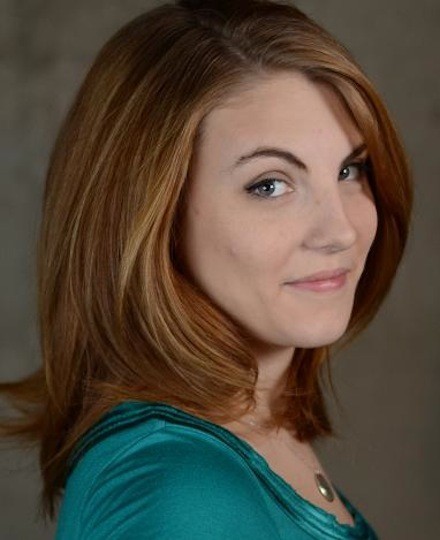
Samantha
I had my first hemorrhagic cyst when I was just fourteen. After a barrage of tests to eliminate insulin problems, my doctor diagnosed me with polycystic ovary syndrome (PCOS), and prescribed hormone therapy to manage it.
Over the next six years, I experimented with a variety of “birth control pills” trying to find one that wouldn’t cause migraines and nausea. Eventually I discovered the NuvaRing, which worked amazingly—except that in graduate school, I couldn’t afford it anymore. This meant I had to deal with periods that were so debilitating, prescription narcotics couldn’t touch the pain. It affected everything in my life.
Once, during the middle of a lecture I was assisting, I felt a sudden, breathtaking surge of pain. I stumbled out of the classroom, half-blind, not even really understanding where I was going except away. I collapsed in the hallway and went into shock, and my boss had to call an ambulance. I waited in the ER for fourteen hours before a doctor told me what had happened: a cyst had ruptured.
Today my medical insurance covers the NuvaRing for free; my periods have returned to something approaching manageable, and I haven’t had any cysts for the last two years. I don’t know what I would do if my employer suddenly stopped covering my treatment.
Rachel McGlone HedinI am a pro-life lactation consultant and public health nurse. I use birth control because I love my husband and three kids. I have had three cesarean sections due to a congenital uterine malformation, and the risk of uterine rupture is too high to get pregnant again.
I never used birth control prior to having kids, though I am a supporter of it for many reasons. Using birth control now protects my life and my family.
Heather Barmore
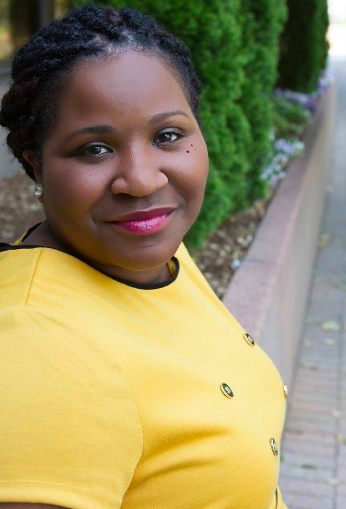
Heather
In 10th grade I had my first incredibly painful period. The cramps were excruciating and I was vomiting. I spent two days at home in the fetal position, wishing my womanhood away. The only things I used to alleviate the pain were Midol and a heating pad.
It wasn't until college, during another month of severe cramps that I resorted to birth control. At the time, I was one of those people who believed there was no need for birth control if I wasn't having sex. Let's just say that ignorance isn't too blissful when you're crumpling in pain once a month.
I use birth control not for precautionary measures—though that is a nice side effect—but because I cannot spend one week out of every month immobilized in bed. I use birth control to improve my health and the quality of my life.
Erica March MenardMy 15-year-old daughter suffers from ulcerative colitis, an autoimmune disease. She was diagnosed at the age of 9. Before starting birth control, her monthly periods (which exacerbate the chronic pain she experiences, especially while in "flare") were so unbearably painful that she couldn't even walk. I'll never forget picking her up at school, where she—a stoic, proud and reserved girl—told me that she had to limp to the nurse's office, in full view of her classmates and with tears running down her face, because she was in such agony.
If my daughter didn't have access to birth control, she would be unable to attend school (or get out of bed to go anywhere else, for that matter) for five days of each month.
Jen Buck
Jen
I first started using birth control as a 16-year-old teenager to help with migraines. There were added advantages that it helped clear up my acne and eased my menstrual cramps.
I was celibate until I was married at age 27, and I took contraceptives that entire time, not for the purpose of birth control.
Now that I am a married woman, I still use birth control because my husband and I feel convicted by God to adopt children. We believe there are more than enough children in the world that need a home, and we want to become parents through adoption rather than biologically.
Kristen
I use birth control because I don’t want to get pregnant. I’m 33 and have been married for six years, and I don’t want to have a child right now—neither does my husband. We use birth-control methods that allow us to carefully and responsibly plan our family. For now, that family is planned for two people, and we’re taking up both slots!
Heather R. Owens
Heather
Just a couple of days ago, a friend of mine put on her Facebook page a disturbing status about how women who are on birth control are all sluts. Little did she know I use birth control because my uterus is misshapen, causing it to have pockets where blood gets caught.
This makes my periods ten times worse than most women's. Birth control allows me to go about my life without being interrupted by three to five days of being completely bedridden.
Dianna AndersonI am no longer on birth control for medical reasons (higher risk of clots in my family), but when I was on it, I used it because I didn't want to get pregnant while working full time, writing full time, and living as a single woman.
My insurance covered it (for a short time) with a $25 co-pay at Planned Parenthood.
JennaI'm a virgin. On birth control.
As a 20-something single, I know I'm going against the norm, even as a Christian. Almost everyone my age has "done it" at least once. But I believe sex is best saved for marriage. I just have seen too many friends hurt and too many lives fall apart to seriously consider sleeping around. Plus, I actually live a pretty great life as an independent single woman and have no desire or plans to change that anytime soon.
So what's with the birth control? Last October, as the sweltering Southern summer faded into a cool autumn breeze, I noticed my friends were getting out their jackets and scarves. I was still burning in my short sleeves. As everyone else shivered in the winter, I started having shaking episodes at least once a day while feeling like I was in an oven. I was suddenly extremely sensitive to sugar and got so lightheaded that once I almost passed out after eating a few M&Ms.
After months of lab tests and doctors and "here, try this medicine and see if it works," I still had no diagnosis. I mentioned to my endocrinologist that I had also become really emotional lately. My anxiety was higher than ever and I was occasionally depressed. I would get angry at nothing or overwhelmed with nondescript emotions taking over my mind and heart. He suggested we try putting me on the Pill for a few months.
I never got an official diagnosis of polycystic ovary syndrome or anything. We eventually gave up trying to find a label for whatever causes these symptoms after testing everything he could. But I can say without a doubt that my life is better because I'm on the Pill.
The shaking episodes have stopped. The hot flashes (that never seemed to "flash" off) are greatly reduced. I'm no longer afraid of passing out in public. Best yet, I'm back to being in control of my emotions instead of drowning in them. I refused to believe the lie that these emotions were "just part of being a girl" or typical "female crazy" as stereotypes would have me believe. My boss, mentors and friends all remarked that this new moody irrationally paranoid girl wasn't the real me, the me they knew before last fall.
Thanks to the Pill, I'm me again. I can live a normal life. Well, normal for me anyway. I'm still a happily single 20-something virgin. Who happens to rely on the Pill to be healthy.
Neely Stansell-Simpson
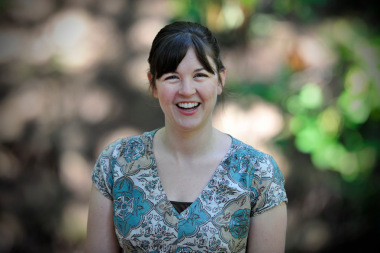
Neely
I recently saw an article that said birth control can be purchased for as little as $9, so health insurance coverage for contraception should be a nonissue. However, not all birth control is the same, and women use birth control for a variety of different reasons.
When I was taking birth control to control ovarian cysts, I had to take a specific type, which was $60 out of pocket, $20 with insurance. $60 is a third of what I budget weekly for groceries. So I definitely want it covered by insurance, especially since I'd much rather take birth control for ovarian cysts than have an ovary removed or get a hysterectomy.
After my daughter was born, I began using an IUD because I was breast feeding, and breast feeding mothers can't use hormonal forms of birth control. An IUD costs $1,000 without insurance. Luckily, my insurance plan at the time covered IUDs. So, I only paid $500. I'm just sayin': this stuff is expensive, y'all! So is health insurance. You know what else is expensive? Babies.
Emmy Kegler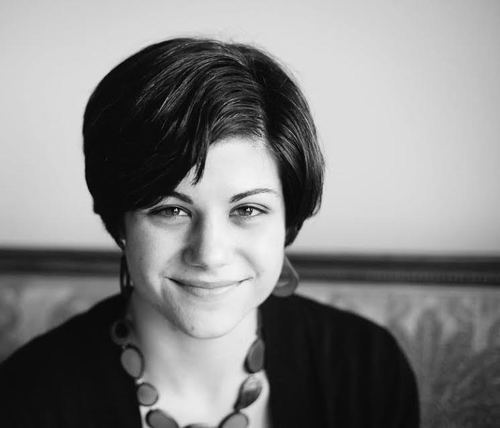
I had painful periods beginning almost immediately at menses at age 13. They got progressively worse, to the point at which (at age 16) the maximum dose of over-the-counter pain medication still couldn't give me relief. Two days a month, I was in immense pain, spending hours cramped up in the fetal position, curled around a hot pack, or soaking in a scalding bath -- trying to get some kind of relief.
I was on Vioxx (rofecoxib) and Tylenol 3 (with codeine), maxing out the daily dosages. I saw three specialists, all of whom were certain it was endometriosis, but after three separate exams, no evidence could be found. The final doc sent me back to my GP, who wrote a prescription for oral birth control -- "the pill", as I knew it then. After a few months, my periods were significantly reduced in pain; just an Advil could take care of the cramps and back pain for a whole day. I was amazed. I spent four years on the pill entirely to regulate that unmanageable pain, and I am so grateful for the doctors who made it possible.
***
Also, be sure to check out Ellen Painter Dollar’s excellent piece, “How Having an (Insurance-Covered) IUD is Saving My Life,” where she writes:
Because of my IUD, I hardly get periods anymore. This is convenient, but it’s far more than that. My periods were horrible, painful, long, irregularly constant (as in, I would sometimes bleed all but three or four days a month), copious, clotty, hideous things. I am deeply grateful for the reproductive goings-on behind even my horrible periods, because they allowed me to conceive and carry three children. I am also deeply grateful to no longer have my vision narrow to a pinpoint in the throes of menstrual cramps or bleed out of my vagina more days of the month than not. (Sorry to be graphic, but I want you to understand from what sort of captivity I’ve been freed.)
More important, because of my IUD, I carry no anxiety about an unwanted pregnancy. My desire not to have another baby is not just because we have three beautiful kids and that feels like enough, just right. I don’t want another baby because I’m convinced that carrying and giving birth to another baby would damage me, and secondarily our entire family, in deep, perhaps irreparable ways....read more.
***
If you are using, or have used, contraception, please feel free to share your stories in the comment section. If you haven’t, maybe consider just listening for a while.



July 13, 2014
Sunday Superlatives 7/13/14
Most Likely To Make You Smile:
“30 Photos of Children Playing from Around the World”
Most Likely To Trigger an “Allergy Attack”:
TVC Thai Life Insurance with "Unsung Hero"
Best Storytelling:
Darlena Cunha at The Washington Post with “This is what happened when I drove my Mercedes to pick up food stamps”
“We didn’t deserve to be poor, any more than we deserved to be rich. Poverty is a circumstance, not a value judgment.”
Best Satire:
Bunmi Laditan with “How to Breastfeed Appropriately”
“Peeing in public and breastfeeding in public are identical because in both cases liquid is coming out. Crying in public is different because it's happening above the neck. If you can breastfeed out of your eye sockets, be my guest.”
Best Series:
Peter Enns with “Aha Moments: Biblical Scholars Tell Their Stories”
“I had been taught to ferret out every exegetical nugget, to mine every nook and cranny for insights into the text. I had spent hours and hours learning Greek, textual criticism, and numerous other exegetical skills, only to be told to abandon them when I ran into a problem that contradicted my overarching approach to the Bible. This was the beginning of the end of my rigid reading of the Bible.”
Best Book Review:
Richard Beck reviews Darwin’s Sacred Cause
“In short, Darwin's thinking about shared human relationships, a shared family tree with common grandparents, inspired both his thoughts about race and provided him with the perfect metaphor to think about the Tree of Life. Darwin's "sacred cause" both pushed and pulled his thinking about the origin of species. Each fueled the other.
Best Writing:
John Blase with “Vespers”
“When I was a child I was afraid of being
lost in this world that is passing away.
So I prayed the sinner’s prayer…”
Best Sermon (nominated by Preston Yancey and Jim Kast-Keat):
Jes Kast-Keat's sermon on Romans 7 at West End Collegiate Church
Best Question:
Scot McKnight, quoting Clark Pinnock in “Clark Pinnock’s Outrageous Doctrine” with—
“Does the one who told us to love our enemies intend to wreak vengeance on his own enemies for all eternity?”
Best Perspective:
Rev. Gay Clark Jennings at RNS with “Christians worship a child who fled violence in his home country”
“The Bible doesn’t tell us who helped them make it across the border to Egypt or who gave them refuge there, but, in Matthew’s telling, we Christians have those anonymous kindly Egyptians to thank for our faith.”
Best Conversation-Starter:
Brendan Nyhan at the New York Times with “When Beliefs and Facts Collide”
“So what should we do? One implication of Mr. Kahan’s study and other research in this field is that we need to try to break the association between identity and factual beliefs on high-profile issues – for instance, by making clear that you can believe in human-induced climate change and still be a conservative Republican like former Representative Bob Inglis or an evangelical Christian like the climate scientist Katharine Hayhoe. But we also need to reduce the incentives for elites to spread misinformation to their followers in the first place. Once people’s cultural and political views get tied up in their factual beliefs, it’s very difficult to undo regardless of the messaging that is used.”
Best Imagery (nominated by Justin Hanvey):
David Henson with "Dirt is Resurrection and God is a Bad Farmer"
"Maybe God knows that the only way to get good soil is through a pile of dead things, of pile of waste, a pile of things others might just throw away. Good soil doesn’t just happen. It is the remnant of faith had and faith lost, of beliefs embraced and beliefs discarded. Good soil is alive through the decomposing of dead things. Good soil is resurrection, for out of the waste and detritus of faith and life springs forth a bountiful harvest. And it is all part of the cycle of soil, the cycle of faith. To have faith and to lose it so that out of the decomposed remains of belief, new life, richer life, deeper life can begin to take root."
Most Haunting:
Shawn Smucker with “Cough. Breathe. Cancer. Dance.”
“I watched her walk into the night, disappear into the darkness, and I thought, none are immortal. None of us will live here forever. We are, all of us, terminal.”
Most Powerful:
Austin Channing Brown with “Made for Whiteness”
“I used to think I was made for white people. I know that sounds a little crazy, but its true…”
Most Helpful (nominated by Hannah Bowman)
Dianna Anderson with “Leaving Purity Culture: Now What?”
“That, then, is our first major underlining principle: you are who God created you to be, as your sexual self.”
Most Beautifully Vulnerable (nominated by Sarah Sweatt Orsborn):
Mary Evelyn Smith with “A leak in the system: when a little girl felt sorry for my son”
“She was maybe six-years-old, smiling and ladylike in a gauzy white dress. The kind of dress that makes me want a daughter. The kind of smile that's heavy on sugar and light on spice. She walked up to my son, as he wheeled in circles outside the sanctuary after church, and planted herself squarely in front of his wheelchair. They studied each other closely. He waved hello. And then, without taking her eyes from his face, she said ‘I feel sorry for him.’”
Most Challenging:
Christena Cleveland with "Dismantling the White Male Industrial Complex"
"My hopes for a just world don’t rest on the white man’s shoulders. My hope is in Jesus and in the power of his death and resurrection."
Bravest:
Rachel Marie Stone with “The Birth Control Debate We Shouldn’t Be Having”
“So yes. I do understand what people feel is at stake. But I also believe that to reject and inhibit access to birth control on the remote and contested possibility that a fertilized egg might not implant is to consign more than a million and a half people annually — mostly children, but many women — to death."
Wisest (nominate by Susie Finkbeiner)
Lorilee Craker with “I am her real mom too”
“Whether or not you ever have a relationship with your child, your journey together continues through the years, through love, prayer, thoughts, and yes, DNA. Speaking for adoptive moms everywhere, we think of you always and tell our children you love them and did the best you could. You are real moms. And to adoptive moms who have been told over and over again, in ways subtle and blunt, that your role in your child’s life is somehow a fraud, a fake, as artificial as a popsicle formed from red dye and chemicals, you know better. You are real moms, too.”
Funniest (nominated by Abby Fahmi)
“Exaggerated Soccer Injuries Looks Ridiculous Off the Field”
Coolest:
Beth Felker Jones with “Women Doing Theology”
Americanah by Chimamanda Ngozi Adichie

This is my first Adichie novel, and I’ve been told by several of her fans it’s not their favorite. I loved the story, characters, and writing in Americanah, but like a lot of folks, found the ending anticlimactic and a tad disappointing. Still, there were too many amazing moments in this one to give it anything less than four stars. Highly recommended. Let me know if you think I should read Half of a Yellow Sun or Purple Hibiscus next.
The Oldest Living Things in the World by Rachel Sussman
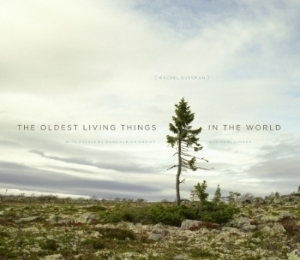
So maybe this was an odd (and ironic?) book to ask for as a birthday present, but Dan knew I’d been pining over it for a while, and I’ve not been disappointed. The Oldest Living Things in the World is a giant book that combines many of my favorite things: a compelling journey/quest narrative, beautiful photographs, and naturalism. (Also, for some reason, the pages smell AMAZING.) Over ten years, artist Rachel Sussman researched, worked with biologists, and traveled the world to photograph continuously living organisms that are 2,000 years old and older. Her quest took her to Antarctica, Greenland, the Mojave Desert the Australian Outback, and all sorts of interesting places. The photos and information are great, but what I really love is Sussman’s point of view. She gave a TED Talk about her project that’s worth a watch. Five stars.
Slow Church by C. Christopher Smith and John Pattison

I'm just digging into this one and enjoying it so far. I don't usually like how-to-do-church books, but this one is different, offering a believable and inspiring alternative to our industrialized approaches to church, which tend to emphasize quantity over quality and programs over people. This one's gotten a lot of buzz, and so far, it seems worthy of it.
I finally finished writing my next (and third) book, Searching for Sunday. It’s a memoir about losing and finding Church, arranged around the seven sacraments. I’m really pleased with how it turned out, though edits still loom. Look for it to hit shelves in April of 2015.
IRL…I’m pretty freakin’ excited that a bunch of you are actually coming to my hometown of Dayton, Tennessee this week for a special Tokens event on “Evolution and the Christian Faith” featuring Pulitzer-Prize-winning author Ed Larson at the famous Rhea County Courthouse. I’ll be there for a short interview as well. Best of all, my friend and fellow blogger Richard Beck and his wife Jana are coming in for the event, which means Dan and I are going to treat them to a tour of Dayton! Last I checked, there weren’t many tickets available, but you can learn more here. If you will be in town, please let me know. I’d love to connect.

***
So, what caught your eye online this week? What’s happening on your blog?



July 11, 2014
Jesus Jukes and Why We Need To Know Where You Stand (by Ben Moberg)
A couple of weeks ago, I engaged in an interesting conversation on Twitter with my friend Ben Moberg and several others about Christian leaders who hold their cards close when it comes to their positions on same-sex relationships and LGBT people. It became clear that such a conversation was worthy of more than 120-characters, (as important conversations often are), so I invited Ben to share his thoughts here on the blog.
Ben is a Christian gay man from Minnesota. After spending his life in the closet within a conservative evangelical culture, Ben, at last, came out and found love and freedom patiently waiting for him on the other side. Ben is a brother to four siblings, the youngest son, the very best uncle, a world traveler, and a painfully slow writer. Between his part-time jobs, he is writing a memoir about finding God in the hardest of places. Be sure to check out Ben’s fantastic blog and his Facebook page.
***

Ben and his adorable nephew
A couple months ago, Jen Hatmaker did the impossible: She wrote that same-sex marriage is sinful and yet left me in layers of love. It was a startling and confusing moment for me.
What I respect most about her article is that she didn’t brush the issue off. She didn’t shy away. She said: “To the degree it rests on my transparency as a leader, I bear responsibility for the conscience of others, and it is unfair to withhold.” Furthermore, she offered up a compassionate and grace-filled way forward for traditional marriage supporters and reminded them that many Christians disagree with their position, but they are no less godly, smart, or loving for doing so. And for all that, I so appreciate her. Even though I believe she is dead wrong.
In the pack I run in, most of my friends are slightly right of center. And when it comes to the issue of same-sex marriage in the church, they are committed to ambiguity. It’s brought up in conversation and they look at me, warmth in their eyes, and say: “You are you. You are not an issue to me. To be honest, I just don’t care about the theology stuff. You’re my friend. That settles it.”
Because I know their intent is good and it certainly sounds sweet and affirming enough, I nod and let it go. Yes, I am happy that I have not been cut down to one characteristic, and yes, I am happy that I am your friend and that you love me no matter what. This is all good news for me.
But just underneath the surface, I rebuff a little. There’s a tic. Something doesn’t feel right, because from my vantage point, there is a world of difference between I don’t know and I don’t care.
To not know is human. It’s where we all begin. There’s nothing shameful or wrong about not knowing where you stand on same-sex relationships. The Bible is a thorny book, chaotic with its thousands of translations. We have to gage cultural contexts, unearth a hermeneutic, parse through the Greek and Hebrew, deal with the anonymous books, the hyperbole, the question of what “God-breathed” actually means, the question of the Gospels’ authority over all the other texts, and the fact that each generation has interpreted Scripture from a different slant, passing the message down like a game of telephone.
Unearthing the truth out of all that is an act of faith in and of itself. Those who’ve done the hard labor ought to be celebrated, no matter where they wind up.
On the one hand, to not care is to have no concern for your brother, your friend, who, depending upon your conclusions, could be stepping off into the abyss of sin, perhaps never to return. On the other, to not care is to be apathetic to the oppression of both the Church and the state on my life. To not care is to think both of these scenarios are unworthy of time spent in study, in prayer, in speaking to God. To not care, in a way, is to not love.
Many Christian leaders that offer up the ambiguous "I Don’t Care" response follow with a suggestion that not caring about this is somehow the way of Jesus. They say they’re more focused on what Jesus did, which was “lovin’ on people” and making friends and all that. In these moments, my “Jesus Juke” detector spikes, as does my blood pressure.
You know the Jesus Juke, right?
Well, it’s quite handy actually. It’s a wormhole that can be opened and jumped through when one is faced with a contentious and complicated issue. The Juker says, for instance, that since Jesus didn’t talk about gays, I don’t need to either! He says that since Jesus talked mostly about poverty, justice for LGBTs is a big distraction, a nuisance, a we’ll-get-to-it-when-we-get-to-it sort of thing. Pushed to the end of his patience rope, the Jesus Juker will inevitably say something like this: Jesus is our unifier. His is our center, so please, for Pete’s sake, DROP IT!
But for me, I can’t. It’s my life and this is our friendship. You are my pastor, you are my teacher, you’re my favorite author, you’re a highly visible voice with influence. You are someone I want to trust. If you can’t trust me enough, love me enough, to be transparent over a rather large part of my journey, then how am I to still trust you?
All I am asking is that you stop sidestepping, that you stop saying, “I choose not reveal, because the culture war is so bad already [and so on and so forth]” when the truth is, you actually haven’t arrived at a conclusion.
If you do know, if you’re in a place of peace with your convictions, then as a leader, you have a responsibility to come out. You don’t get to withhold. That’s the burden of being a leader.
If you don’t know yet, then say that. Don’t Jesus Juke. Don’t claim abstention. Grab a Bible and some commentaries, grow a hermeneutic, and then go figure out what your role in this conversation is going to be.
Unless, that is, you actually don’t care. Then disregard this message altogether. Let us all know, so we can move on to someone who does.
***
Thoughts? Do Christian leaders have an obligation to share their position on same-sex relationships? How do you respond to those who say that since Jesus didn’t address homosexuality, they won’t either? Would love to get your feedback. Please be respectful.
If you want to hear more from Ben (and trust me, you do), check out his blog. He also writes for Deeper Story.



July 8, 2014
5 Ways Progressive Mainline Churches Can Welcome Disenfranchised Evangelicals

© 2009 Eduardo Zárate, Flickr | CC-BY-ND | via Wylio
I’ve never considered denominationalism a bad thing. I like to think of the various Christians traditions as different facets of a diamond refracting the same light, or as workers tending to a shared garden but with unique tasks, or as a single body made of many interconnected parts (see 1 Corinthians 12). No single group owns the copyright to Truth, and we need one another.
There is much to love about evangelicalism, but lately I’ve been receiving a lot of messages from disenfranchised evangelicals who, after a break from church, are looking to return. Many hope to find a place in a more progressive tradition, but feel a bit disoriented their first time in an Episcopal Church or at a PCUSA coffee hour. In addition, when I travel, I meet many progressive ministers who are eager to welcome new people to their churches. So with all that in mind, here are some ideas for helping those evangelical visitors feel more at home:
1. Update your Web site.Disenfranchised evangelicals aren’t looking for a highly-produced show. They aren't looking to be impressed by the latest and greatest technology. (They’ve had enough of all that, trust me.) They are, however, looking for your address. And maybe a belief statement of some sort.
Millennials in particular tend to start their search for anything—be it a church or an apartment or even a date— on the Internet, so if your site is difficult to navigate and embarrassingly out-of-date, they may not bother to come for a visit. I also appreciate it when a church’s Web site includes information about beliefs, ministries, worship, ministerial staff, educational programs, etc. And if your church is located in a more conservative area (say, East Tennessee), you might even want to make special note of the fact that you welcome LGBT people and affirm women in ministry.
Just keep in mind that often our first "visit" to your church is via the Web site. So it might be worth putting some extra time and resources into it.
2. Take risks on unconventional church plants.
In my next book, I feature several unusual church plants that are thriving in their communities, and many are associated with mainline Protestant denominations that were willing to take a risk on unconventional models. One such church is St. Lydia’s in Brooklyn—a small “dinner church” centered around the Eucharist as both a sacred ritual and a meal. St. Lydia's is associated with the Evangelical Lutheran Church of America.
Another church that comes to mind is Missiongathering in San Diego, which is associated with the progressive denomination The Christian Church (Disciples of Christ), but which has a very evangelical “feel” to its worship because it attracts a lot of folks who come from evangelical traditions and enjoy evangelical worship but are looking for a church that welcomes LGBT people. I think too of Nadia Bolz-Weber’s House for All Sinners and Saints in Denver, also associated with the ELCA.
I’m no expert on church planting, but what these churches seem to have in common is a pastor with a vision for ministering in a unique way to a specific group of people in a specific neighborhood, partnering with a denomination that can help with resources and accountability. These days, it’s less about getting people to come to you and more about going out, serving the people, and then letting them build the church together.
A lot of disenfranchised evangelicals like me are drawn to the beautiful and ancient liturgy of more traditional churches. For us, it’s a refreshing alternative to the highly-produced contemporary worship services we’ve grown used to (conversely, folks who grew up with more traditional worship may love the contemporary worship of an evangelical church). So you don’t have to replace your smells and bells with electric guitars to welcome evangelicals. But it’s nice to see a little creativity infused into the liturgy.
House for All Sinners and Saints seems to do this beautifully. On their Web site, they explain:
“We follow the ancient liturgy of the church (chanting the Kyrie, readings from scripture, chanting the Psalm, sermon, prayers of the people, Eucharist, benediction, etc.) We also sing the old hymns of the church. So there's lots of ancient tradition at HFASS, but there's also some innovation. We always include poetry and a time called ‘Open Space’ in which we slow down for prayer and other opportunities to actively engage the Gospel; writing in the community's Book of Thanks, writing prayers, making art or assembling bleach kits for the needle exchange in Denver. We like to say that we are ‘anti-excellence/pro-participation’, meaning that the liturgy is led by the people who show up…”
St. Gregory of Nyssa Episcopal Church in San Francisco also takes a creative approach to their traditional liturgy. Check out the worship section of their Web site.
You don’t have to make any radical changes all at once, or go as far as HFASS and Gregory of Nyssa, but doing things differently now and then actually enriches the inherent beauty of the liturgy and reminds both longtime members and newbies why it's so central and so important to the life of your church.
4. Don’t assume we know why you believe what you believe, or why you do what you do.
The other day I had a conversation with a young woman who grew up Methodist. She explained to me that when she went to college and began attending a conservative complementarian church with her friends, she felt ill-prepared to explain why she supported women in ministry. “They had all the Bible verses,” she said. “And I had no idea how to respond to them. I guess growing up Methodist I’d always taken women pastors for granted.” She grew up knowing her church affirmed women in ministry, but she never learned why her church affirmed women in ministry.
I also hear from a lot of evangelicals who have begun attending Mainline Protestant churches precisely because they welcome LGBT people, accept science, avoid aligning with a single political party, practice traditional worship, preach from the lectionary, affirm women in ministry, etc. but these new attendees never hear the leadership of the church explain why this is the case. This need not happen from the pulpit, but perhaps a Sunday school class or Bible study addressing these issues would be helpful, not only for those new to the church but also for those who grew up in the tradition and need a refresher.
Also, don't assume people know all the nuances of your particular tradition. I can't tell you how often I've spoken at a Baptist church (American or Cooperative) and had readers come up to me and say, "I can't believe they let you speak in a Baptist church!" because they assumed all Baptist churches are like Southern Baptist churches.
The Episcopal church we’ve been (somewhat sporadically) attending held “Anglicanism 101” classes recently that served as both an introduction to Anglican theology and practice and as confirmation classes. We were unable to attend due to travel, but two of our friends (former evangelicals) did, and they were confirmed this spring. They said many in the class were longtime Episcopalians there for a refresher, and many disenfranchised evangelicals just learning the ropes.
(Note: If you're an evangelical finding your way to a church in the Anglican tradition, you will love Evangelicals on the Canterbury Trail by Robert Webber.)
5. Create safe places to talk and build relationships.
We former evangelicals LOVE to talk about our faith and are sometimes surprised by how little opportunity there is to do so in a Mainline Protestant church environment. I’m not sure why this is, but it seems like Mainline Protestant churches are less likely to have “small groups” where members gather together in one another’s homes to simply share life together. (If I’m making an unfair assumption or generalization, let me know.) Obviously, such groups can be problematic when they divide everyone up by age group and marital status, but I’ve also seen them represent what is most powerful about church as members become deeply invested in one another’s lives. Weekday Bible studies can also serve this purpose, or perhaps even certain Sunday school gatherings. I’m convinced that one thing folks from my generation long for is the chance to talk openly and honestly about our faith, our doubts, our questions, our ideas, our struggles, our joys, etc. in the context of a faith community.
What else? How can progressive Mainline Protestant churches welcome disenfranchised evangelicals?



July 7, 2014
Reentry.
My goal with the first book was to finish. My goal with the second book was to start a conversation. My goal with the third book was to write it well—to take my time crafting each sentence, to think of my readers with every story and every paragraph, to find the just the right verb, even if it meant searching for it for an hour.
I turned my third book in six months late.
But I’m pleased to say I sent the first draft of Searching for Sunday to my editor at Thomas Nelson last week. The book is a memoir about my search for Church, told through an exploration of the seven sacraments—baptism, confession, holy orders, communion, confirmation, anointing of the sick, and marriage.
I’m really excited about this one. I think a lot of you will resonate with my story and the stories of so many others who are trying to make sense of what it means to be part of the Church at this time in history. (I’ll update you on the release date as soon as I know the publishing timeline.)
I’m also exhausted, a good 15 pounds heavier than when I started, and mildly addicted to Three Sisters Kicking Horse coffee/chocolate animal crackers/Gregory Alan Isakov.
And as any creative knows, I have now entered the strange period of “reentry” when I step out from my home office, squint in the harsh sunlight, and survey the landscape of all I have neglected these past few months.
Do I tackle the bathroom I haven’t cleaned since Easter?
The treadmill I haven’t used since January?
The 706 unanswered emails in my inbox?
The blog I’ve been neglecting?
The friends I haven’t called back?
The church I haven’t attended in a month because I’ve been busy writing my book about church?
Faced with these tough decisions, I settled on tackling the new season of “Orange Is the New Black”—binge watching all 13 episodes in my pajamas with Dan. (The second season is way better than the first, don’t you think?)
But now that my pacifist convictions have been sufficiently challenged by a fictional character (Vee!), it’s time to get back to work. I’m especially looking forward to settling back into the rhythm of the blog, with Sunday Superlatives, Lectionary Thursdays, and interviews and guest posts on Tuesdays and Fridays. While book-writing gives you the chance to go deeper with a topic, it lacks the collaborative spirit of blogging, so I look forward to engaging in those spirited and informative conversations with you once again.
As I make blogging plans for the rest of the summer, let me know if there are topics you would like to see covered here. What questions are you wrestling with right now? What do you feel is missing from the religious blogosphere? Is there a part of my own journey/story you would like to hear more about? Do you have suggestions for interviews and guest posts? Let me know! Don’t be shy!
Thanks so much for your patience and encouragement during this crazy season. Even when I was quiet on social media, I was thinking of you with every single word of this book. I wrote it for you.



July 2, 2014
The Blessings Behind Those Floodgates (by Caryn Rivadeneira)
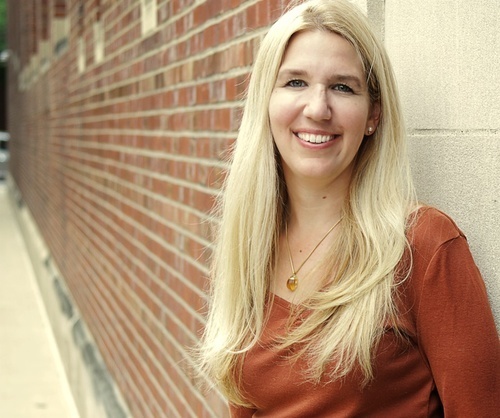
Today I’m pleased to introduce you to my friend Caryn Rivadeneira. Caryn is a writer, speaker and author of five books, including her newest,
Broke: What Financial Desperation Revealed About God’s Abundance
(InterVarsity Press, 2014). Caryn is a regular contributor to Christianity Today’s Her.meneutics, a columnist for ThinkChristian, and has written for OnFaith, Relevant, Christianity Today, among others. Caryn lives in the western suburbs of Chicago with her husband, three kids and one rescued pit bull. Visit Caryn at carynrivadeneira.com
I always appreciate Caryn’s thoughtful take on things, and today in no different. Enjoy!
***
Not long ago, I’d’ve flipped. I’d’ve gone nuts upon reading that Ed Young, fancy pastor extraordinaire of Fellowship Church in Grapevine, Texas, joined the ranks of pastors who issue a “Tithe Challenge,” offering a “money-back guarantee” if God doesn’t bless your tithe in 90 days by opening the floodgates of heaven on your rear and leaving you maniacally laughing in a ball pit of money tossing cash into the air (or something like that).
In fact, had I heard the challenge issued, I’d have been one of those standing in line asking for my money back. After all, it was while we were above-and-beyond-the-tithe faithful givers and just after we’d filled a pledge to donate sacrificial chunks of change to our church’s building campaign that we began our descent (slow at first, then picking up nice steam) from cushy, comfy well-off to broke. The kind of broke when businesses and economies slump, dragging incomes down with them, when babies are born without insurance and ginormous hospital bills go unpaid for far too long and interest heaps on, when businesses die and new jobs can’t be found, when mortgages can only be covered by the good grace of family members, and when food is bought on credit or gift cards from kind friends.
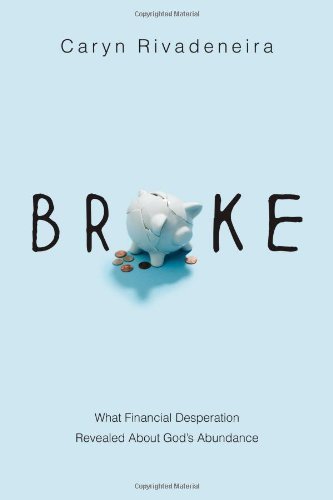
This kind of broke makes you cancel the pledge you made to church and to God because God, in fact, did not seem to open the floodgates of heaven. This kind of broke makes you read the words of Malachi 3:10, the verse Ed Young bases his challenge on, and doubt God—his goodness, his faithfulness, his existence.
But this time I did not flip out. I did not go nuts upon reading that Ed Young offered this money-back guarantee from God. Because Ed Young is right. Dead right. God is true to his promise in Malachi. God blesses our socks off when we give faithfully, sacrificially, when we bring the tithe.
But the blessing is always (usually) what we expect.
So here’s the deal. People who are rich (whether globally rich—meaning those who make enough to pay basic bills, keep a roof over their heads, a car in the driveway, food on the table and clothes on backs—or American rich—meaning they have all that and all the extras too) and who don’t falter from wealth, who don’t teeter into the land of the financially desperate, will of course read God’s promises different from those who are broke.
“Bring the whole tithe into the storehouse,” God says in Malachi 3:10,“that there may be food in my house. Test me in this…and see if I will not throw open the floodgates of heaven and pour out so much blessing that there will not be room enough to store it.”
It’s no wonder rich pastors like Ed Young cling to this. I’m sure Pastor Young gives faithfully and therefore Malachi 3:10 handily helps him hang his wealth on God. No guilt about his million dollar homes, planes, salary or even that other extra pair of Spanx. Because God blesses!
And, naturally I get why this verse appeals to broke folks: being broke stinks. Not having enough to cover the bills, fretting month after month about how to pay rent or mortgages or keep utilities on and kids fed and supplied stinks. So when this lovely promise in Malachi offers the fresh scent of financial abundance, we’re all over it.
Of course, the problem is that while God may very well have been talking about material blessings as a “proof” of his faithfulness and his longing for his people to “return to me” (doesn’t that break your heart?) and though God certainly could’ve used stuff to woo back the wandering Israelites back from their jagged journey as God’s people, it’s tough to look at Scripture as a whole and believe that money, money, money is God’s blessing of choice.
Certainly it isn’t by the time of Jesus. With Jesus, wealth isn’t so much a blessing as something that gets in the way of being blessed. At least, that’s what Jesus says—in the Beatitudes, to the rich young ruler. And I’m going to go out on a limb that Jesus brought his first fruits faithfully (and paid his taxes dutifully) but Jesus seemed a bit strapped for cash, praying for his bread every single day and all.
So it goes to figure that if God really wants to bless us, if he really wants to prove his faithfulness and if God is interested in blessing us so that we experience his goodness and bring about his kingdom, maybe—sometimes—he’s going to allow us to have less money rather than more. He’s going to let our gaze fall from the stuff we want and maybe move it toward the hurts of this world, toward our individual callings or turn our eyes upon Jesus, as the song says. So sometimes those floodgates will pour out blessings that look much more like brokenness, suffering, challenges so that we can know God’s goodness, his presence, in ways that have nothing to do with dollar signs.
But, of course, not always. Sometimes those blessings are financial. To deny that right-on-time check or the loan of a cabin for a summer vacation you could never afford is from God would be ungracious. Rude.
Even still: most of the blessings we receive don’t come within 90 days of an act of obedience. Instead, they come straight from God’s love on his timetable. And they don’t come with a money-back-guarantee because there’s no money required. They’re free. Gratis. Grace.
Giving is good. Giving is wise. And God blesses our giving and uses it to bless. But when we hold God to our standard of what blessings should be and if we stand ready to ask for our money back from God, we’re neither being blessings nor being blessed. And we certainly ain’t getting richer.
***
For more, be sure to check out Broke: What Financial Desperation Revealed About God’s Abundance.



June 26, 2014
Where I get my stock photos...

© 2014 Robert Jinks, Flickr | CC-BY-ND | via Wylio
While I’ve been busy finishing up this book, Dan and the Wylio team have been working on an updated version of the site that lets bloggers (and others) find, resize, attribute, and embed creative commons images, all in a few painless steps. (Not to take too much credit , but it was my complaints about the headache of finding and using legal stock photos online that inspired the original idea, so basically this is all my doing.)
One of the coolest features of the new version is platform-specific embed codes for Wordpress, Squarespace, etc. Also, the searching experience is prettier and there more than 100 million images to choose from.
Anyway, if you're a blogger and you have questions about Wylio, I know a guy...



June 13, 2014
Church Story: "I hold all these things in my heart" (by Jerusalem Jackson Greer)
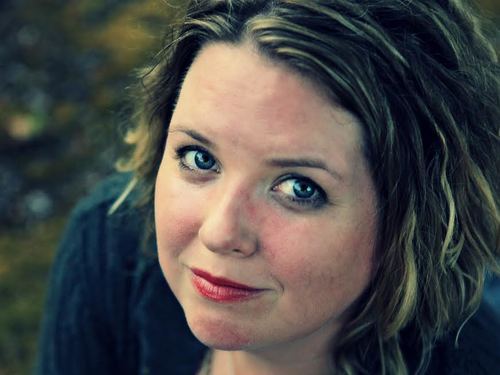
Today I am just thrilled to share a really powerful and relatable guest post from my friend and fellow sojourner, Jerusalem Jackson Greer.
Jerusalem is a writer, speaker, nest-fluffer, urban farm-gal, and author of A Homemade Year: The Blessings of Cooking, Crafting and Coming Together. She is currently serving as the Lay Minister to Children, Youth, and Families at St. Peter's Episcopal Church in Conway, Arkansas. Jerusalem lives with her husband and two sons at the crossroads of beauty and mess with an ever-changing rotation of pets, including a hen house full of chickens. As a family, they are attempting to live a slower version of modern life. She blogs about all of this and more at jerusalemgreer.com
Enjoy!
***
The other evening I found my 9 year old son Miles rolled up in the blankets on my bed in a very melancholy state. When I asked him what was wrong, he answered “I’m not little anymore.”
And it is true.
He isn’t little anymore.
And it is bittersweet for both of us.
So I did the only thing I knew to do.
I crawled up on the bed with him and laid with my forehead touching his and whispered, “You know what? You get to keep all the ages you have ever been inside you. They never have to leave. You can keep them as long as you want and visit them in your heart anytime you want.”
I think I said it as much for myself as for him.
I wasn’t sure if I believed it until I saw his eyes.
Until I felt his breath release and the weight of grief fall off as he hugged my neck so tight.
The church (as Shauna Niequist so eloquently wrote once) is my sister. She was my playmate, my constant companion, my comforter.
I was raised in small version of what my husband has dubbed, with no small amount of tongue-in-cheek, “a small evangelical dynasty.”
Evangelicalism, specifically Southern Baptist evangelicalism, was not only my faith, it was my family.
It was the family business.
It was the language we used to communicate.
It was the lens through which we saw the entire world.
But then I fell in love with a Pentecostal preacher’s boy. And so I followed him for a bit. To see if I could live in that skin.
And in the end, even baptized in the Holy Spirit as I was, the answer was no.
To the boy and that particular expression of faith.
And then I finished my liberal arts education and married a Baptist preacher’s son and together we stepped out of our parent’s worlds and right into the wide, exuberant, hands held-high, praise and worship world of non-denominational faith and small group fellowships.
And it was fresh air.
And it was intense.
And It was magic.
Until it wasn't.
And then I was a mom, and a co-pastor in a Vineyard-turned Emergent expression.
And it was freedom.
And it was grace filled.
And it was a beautiful mess.
And it was very necessary.
Until it wasn’t.
And during all this time I was following little liturgical breadcrumbs left by those who had gone before - my Presbyterian grandmother, friends who were raised Lutheran, Catholic, and Methodist.
And then there were the books… The writings of Phyllis Tickle, Kathleen Norris, Barbara Brown Taylor, St. Francis, and Brother Lawrence...
And as I scratched harder at the surface of my assumptions about what the liturgical life meant, I begin to wonder how I could live a liturgical life at home with my kids, celebrating all the lovely, ancient, traditions I was discovering.
Eventually my experiments and discoveries led to me writing a book about my faith journey and how we celebrate the church year in our home.
And when that was all done, when the two years of writing and research and more writing was complete and the book was off the presses, I found that I had developed a craving to be a part of a community that also celebrated these things - These ancient traditions that felt shockingly relevant to my modern life.
And so, rather unexpectedly, I found myself comfortably perched on three legged stool of the Episcopal tradition.
Now I am a part of an Episcopalian family and diocese where many - including my priest - are converted Baptist. (This helps my mother sleep better at night.)
And I sleep better at night, because I feel like I have come home.
I feel the things that it seems like new converts feel - something I have always craved as a lifelong believer.
Relief.
Belonging
Acceptance,
Understanding,
Excitement.
Wonder.
Insatiable curiosity.
But I believe strongly that all of this is possible because I arrived at this place with all of those other parts of me in tow.
I did not shed their gifts - the gifts of my Gospel preaching Southern Baptist, Evangelical, Holy Ghost, Small Group, Praise and Worship, Coffee Bars and Social Justice years.
I am all of those streams.
They are all inside me.
They are all part of who I am.
They do not erase each other.
They do not negate each other.
They flow in and out of each other, they strengthen each other, and I live out of the best parts of all of them.
As a mother I have learned that my heart can expand to love all those in my care. And so I also believe that our hearts can expand to hold all we need to live as we are created to be.
We can hold more than one thing in the same hand.
###
By the way, Jerusalem is just as cool in real life as she is in her writing. I know because I've eaten pie with her. Be sure to check out Jerusalem's blog and book.



June 10, 2014
Ask Brian McLaren…(Response)
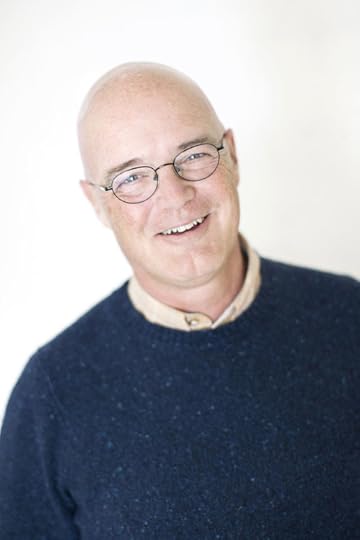
You posed some really fantastic questions for our guest today—Brian McLaren—and Brian responded with his characteristic depth, graciousness, and sincerity. The result is a truly fascinating interview.
As you already know, Brian is an author, speaker, activist, and networker among innovative Christian leaders. He began his career as a college English teacher and then worked as a church planter and pastor for twenty-four years. His dozen-plus books include A New Kind of Christianity, A Generous Orthodoxy, Naked Spirituality,and Why Did Jesus, Moses, the Buddha, and Mohammed Cross the Road? Brian’s latest book, We Make the Road by Walking, releases today! I had the chance to read an early copy and it’s one of my favorites of Brian's. Organized around the traditional church year, each chapter reflects on a different story from Scripture and invites contemplation, discussion, and action.
Brian took a lot of time and care responding to your questions. Hope you enjoy this conversation as much as I did:
***
From Daneen: I love Brian's books! They have been water for my parched soul. I want to ask him about an idea I've seen recently via a friend [Ryan Bell of the “Year Without God” project] who used to be a progressive Adventist pastor, but is now exploring atheism. Recently he posted that he thinks progressive Christianity is just a slower way to admit that there isn't a God. It got a huge amount of response from others who agreed and said that had been their path to atheism. I guess that's my question, and I'm sure he's thought of this. How would he respond to that idea that progressive Christianity is just a slower path to non-theism altogether?
Daneen, get ready for a super-long answer. I couldn't be briefer because this question is so big, important, and timely.
I think it's worthwhile to note that when the early Christians favored God as revealed in Christ over the Roman pantheon, they were called atheists. The only gods that counted were the Roman gods, so anyone who didn't believe in those gods was an atheist. Similarly, at the time of the Reformation, I can imagine Roman Catholics saying that Protestantism was a first step toward atheism … and then when Protestant intellectuals like David Hume and others more or less embraced atheism, Catholic warnings must have seemed prescient.
Both of these examples suggest that atheism often means "disbelief in the God of the establishment," since those in power typically define the God who is supposed to be believed in. Every new conception of God necessarily requires doubting or rejecting the prevailing conception of God. So you could say that theism only evolves through atheism. I think there's a kind of yin-yang between the two.
To put it starkly, Jesus must disbelieve in the God who loves our friends and hates our enemies in order to envision a God who manifests a compassionate perfection toward "the just and the unjust" as he does in the Sermon on the Mount.
Rachel's first book and this remarkable blogspace she has created are surfacing what my work is also surfacing: there are lots of people who are losing faith in the gods of the establishments (of which there are many). For many, the process is like peeling an onion. First they lose faith in the 6-day creationist god, then in the bible-dictation god, then in the male-supremacy god, then in the european-supremacy/western-civilization/colonialist god, then in the anti-gay god, then in the pro-war god, then in the American-exceptionalism/manifest-destiny god, then in the anti-palestinian god, then in the controller-of-everything-that-happens god, then in the design-engineer god, then in the penal-substitutionary-atonement god, and so on. Of course the detail and order of events may vary, but eventually, every layer of the onion is peeled away and one is left with nothing … but maybe some tears.
The fear of being left with nothing leaves many people desperately afraid to question anything, which might be a good definition of fundamentalism. You mentioned Ryan Bell, whom I know and like a lot. I haven't followed Ryan Bell's blog as closely as I wish I could, but I check in when I can and I was impressed by this remark he made in passing recently: "For Christians, generally speaking, faith is the virtue that makes them impervious to new evidence." I think that's an accurate - and tragic - statement, generally speaking. But I especially agreed with what Ryan said next: "But none of us have anything to fear from the truth. And even when fear is an appropriate response, I would rather confront a fearful truth than be comforted by a lie."
The establishment understandings of God are indeed under assault, and open-minded believers are forced to grapple with "new evidence" of unprecedented magnitude, as the recent photograph from the Hubble telescope made amazingly clear.
To believe in God as creator of a cosmos of billions of galaxies that have developed over 13.82 (or whatever) billion years requires disbelieving the God who was creator of one world in the center of one crystalline sphere that was made 6-10,000 years ago.
And of course, it's not just cosmology. Neurobiology … anthropology … psychology … sociology … history … semiotics … nearly every field challenges the conventional packages of concepts that are associated with the word God, whoever is speaking it.
The question, I think, is this: what happens after one peels away the onion and faces the possibility that there is nothing left? Will any concept of meaning, purpose, value, direction, and value come back? As my friend Steve McIntosh asked me earlier this year, "Can we get God back at a higher level?"
I think Ryan Bell is grappling with this challenge. In order to get God back at a higher level, we have to be willing to let the lower level conceptions of God go. Peter Rollins has been another courageous thinker in this regard. The process isn't easy. The outcomes aren't guaranteed. We have to make room for one another to be at different places, in different "time zones" if you will, which is hard for many people to do - and nearly impossible for some churches to allow, sad to say.
I have tended to do this kind of deconstructive questioning in private, and then write about the positive conclusions I've reached. But the deconstructive work must also be written about. Maybe my approach has been more pastoral, and Ryan's and Peter's more philosophical … but both are needed.
A philosopher who has engaged with this process in a very helpful way for me is Richard Kearney. The title of his book Anatheism suggests the recovery of God after atheism - not old theism, not atheism, but a new search for God after one has lost his or her old faith. Here are a few choice quotes from Anatheism:
So much depends, of course, on what we mean by God. If transcendence is indeed a surplus of meaning, it requires a process of endless interpretation…. The absolute requires pluralism to avoid absolutism. (xiv)If the Word was in the beginning, so was hermeneutics. There is no God’s-eye view of things available to us. For we are not Gods, and history tells us that attempts to become so lead to intellectual and political catastrophe. Hermeneutics is a lesson in humility (we all speak from finite situations) as well as imagination (we fill in the gaps between available and ulterior meanings). Hermeneutics remind us that the holiest of books are works of interpretation – for authors no less than readers. Moses smashed the written tablets; Jesus never wrote a single word (only a scribble in the sand to prevent a woman being stoned); and Muhammad spoke, after much hesitation, but left writing to others. (xv)
And that is, I think, a grace of philosophy. It opens a space for the questioning of God where theists and atheists may converse. It invites us to revise old interpretations and reimagine new ones. (xvii)
The figural saves God from the literal. For faith is not just the art of the impossible but an art of endless hermeneutics. (14)
… the absolute can never be understood absolutely by any single person or religion. (16)
The great stories of Israel are, I am suggesting, testaments to the paradoxical origins of religion in both violent conflict and peaceful embrace. This, in effect, makes every dramatic encounter between the human and the divine into a radical hermeneutic wager: compassion or murder. You either welcome or refuse the stranger. Monotheism is the history of this wager. (22)
Obviously, I could go on and on. But I want to mention two other quotes from Kearney that intersect with my own work.
First, Kearney asks, "So what exactly did Bonhoeffer mean when he advocated an 'irreligious Christianity?' … Religion was but a ‘garment’ tailored to the needs of different historical epochs over two thousand years. So the real question for us today is What kind of God could be the Lord of a nonreligious Christianity? .. Bohoeffer’s postreligious Christianity took the form of an atheistic rejection of the metaphysical God combined with a belief in the suffering God. (66-67)"
I haven't spoken of this much, but this insight was very much behind my book Naked Spirituality. We need a spirituality that allows us to strip away old conceptions and welcome new ones … a faith that is (to evoke my new title) a road, not a warehouse or parking lot. A flexible (or naked) spirituality carries us, I think, when our bolted-down theology falls apart on us.
Second, Kearney says, "…one must, I suggest, abandon the old God of sovereignty and theodicy. That Master God must die so that the God of inteconfessional hospitality can be born. And, insofar as religious dogma has often served as vehicle of infantile fear and dependency, the interreligious God may be described as a postdogmatic God. That is why anatheism appreciates a rigorous atheistic critique of the theistic perversions of religion." (52)
Obviously, this was a big part of my last book, Why Did Jesus, Moses, the Buddha, and Mohammed Cross the Road? In my new book, We Make the Road by Walking, I read the Bible not as a static revelation of God in a system, but as a dynamic narrative of human discovery as old conceptions of God die and new conceptions are born in the vacuum. To be a believer is not to stop or freeze the quest for bigger and better and deeper and truer conceptions of what is ultimate and true and beautiful and valuable, but to join it.
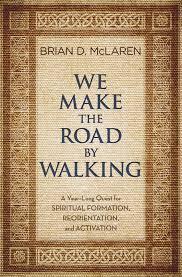
So … to get back to your question: Some forms of atheism, like some forms of religion, are also parking lots or warehouses. They mark the end of questioning, search, wondering, imagining, hoping, dreaming, opening. But I trust that for many, atheism is more like taking off of a suit of clothes that no longer fits. It is scary to be naked … especially when there are accusatory and mocking inquisitors out there ready to pounce, mock, criticize, and so on, motivated by the kind of fear that Ryan wrote about.
So, Daneen, we might say that good faith is at heart not becoming "impervious to new evidence," but rather the reverse: a vulnerability to new evidence and possibilities, a nakedness of the kind we experience at birth or when we go to the doctor or when we make love, a confession that "I haven't yet arrived, but am still on the road, still seeking, still on the quest." Whatever God is, God must not be smaller than our questions! So for me, one of the meanings of the resurrection is that just after you think God has died, a surprise is in store. I would hope that whatever progressive/emergence/etc. Christianity is … it makes room both for the questioning and the surprise.
From Vanessa: Almost a decade ago, my husband picked up a copy of A New Kind of Christian and it proceeded to wreck my safe and well-ordered life. If you happen to remember meeting me, I'm the one who told you that there were times in the years that followed that I wanted to punch you in the face. Since that time, though, I've mellowed and fully embraced my new, amazing life as an emergent church planter.
My question is about our kids. In the old, established fundamentalist/ evangelical world, we knew what the product of our parenting was supposed to look like, and my husband and I were everything the establishment dreamed we would be (for awhile anyway). We are finding parenting teens in this new, un-programmed, dismantled, church environment a little agoraphobia-inducing. What does a healthy young person look like after growing up in Emergence Christianity? What are we shooting for in the faith-education of our kids?
Another tremendous question, Vanessa. I've been complaining about the same things and asking the same questions for several years, which is why I'm so grateful to a group that has come together under the name Faith Forward to grapple with exactly these questions. You can learn more at http://faith-forward.net.
I don't think the ideal long-term is "un-programmed, dismantled, agoraphobia-inducing" church environments. I think we need to reconstruct in the ruins of what has been deconstructed - and, of course, to do so in a wise and re-deconstructible (iterative) way. That's a big part of what my new book tries to do: propose (by example rather than argument) new ways of reading the Bible, new ways of imagining church gatherings, new ways of inviting rather than suppressing questions and dialogue.
Will it "work?" One can only hope. But it's clear for many of us that we aren't faced with a choice between a status quo that is working and a radical new proposal that might not work. Rather, we are faced with a status quo that is not working for more and more people, and new proposals that may work. We will only know by pressing on in faith.
I might add that the earliest Christians must have faced a similar situation. Could the faith possibly be passed on without circumcision, temple, priesthood, sacrifice, holy city, and so on? It was a daring risk to imagine that it could. It took ongoing experimentation to find new forms that worked. Each form created new problems, of course, as it solved others, which is why we're never finished. Again, we're on a road, not sitting in a parking lot.
From Chris: Do any current members of the evangelical establishment ever approach you discretely to show support or to receive counsel ala Nicodemus? Not interested in names as much as what that conversation tends to look/sound like.
Nobody ever asked me this before, Chris. Short answer, yes. I'll give a few quick examples.
Several years ago, an executive of an Evangelical organization met me in a hallway. "Ah, McLaren. I've read your work and I don't like it. I disagree with it on almost every page," he said. Then he paused, "But my adult sons are far from the church and far from God, and if they ever come back, I imagine it will be to your kind of Christianity and not mine." Then, almost by accident, it seemed, he added, "So I guess I wish you well." Then he walked away.
Another fellow in that same organization emailed me once and said, "Some of my colleagues are out to destroy you. I appreciate what you're doing, so I just wanted to warn you to watch your back."
When some Evangelical magazines and websites wrote snarky things about my participation in my gay son's wedding, several prominent Evangelicals contacted me in private and said, "You did the right thing." One told me that the hardest part of his job as a denominational executive was hearing from the parents of gay children who were driven out of churches in his denomination. He couldn't change the denomination without splitting it, he said, and he was glad that he could retire soon because he couldn't stand the agony of being part of causing pain for so many gay people and their families. A charismatic leader told me had had performed a wedding in private for his gay grandson. People would be shocked how many people seem to support the status quo by their public silence, but privately aren't there.
A couple years ago I was in a restaurant eating with my wife. My phone rang and it was a very prominent Evangelical writer. "I was just in a conversation with so and so and so and so." (He mentioned two other well-known Evangelicals.) "Your name came up and all three of us admitted that we read you and largely agree with you. I thought you would want to know that. There are a lot of people who are silent, but they're re-thinking things." Then he hung up and my wife and I finished our supper. It was kind of surreal.
From Jonathan: Have you seen any examples of emergent ministry in small towns or rural locations? How can ministers serving in rural areas reach the emerging generation while also serving parishioners with highly traditional and conservative values?
Yes to your first question, Jonathan. In fact, some of the most surprising experiments are taking place in these settings precisely because younger generations are being driven away in such large numbers. But your second question surfaces the problem. The people who helping "emerging generations" usually can't simultaneously help the highly conservative/traditional folks.
It does happen occasionally, and I could imagine it happening more. The minister would need to serve the traditional congregation well, while maintaining his/her integrity by not saying things he/she didn't believe. This is often hard, but with a lot of wisdom (wise as serpents, innocent as doves?) it can be done. Then, in his/her free time - not "on the clock" so to speak - the minister could invite some people over to his/her house, or meet with them in a restaurant or coffee shop or whatever. Sometimes the people the minister would be helping in secret would be the sons and daughters of those who would fire him if they knew. That kind of ministry life isn't for everyone - but it isn't boring!
From Meagan: Brian (can I call you Brian?), I'm currently in the middle of your book Why Did Jesus, Moses, the Buddha, and Mohammed Cross the Road?, and so far, it's a refreshing and interesting read (and the first of your books I've ever read). Many of the struggles and tensions you discuss describe my own faith journey right now. I come from a similar conservative background, and several of the ideas and thoughts I grew up with have been shaken down around me within the last few years (mostly thanks to writers like Donald Miller, Jen Hatmaker, and Rachel, of course). My question for you is: How do you personally handle push-back? I'm not sure what your personality type is, but I'm the type of person who is comfortable when most everyone likes me. However, much of my thinking no longer meshes well with many people from my childhood, and I've been largely afraid to "come out" as not-so-politically/theologically-conservative anymore. What advice would you give to someone like me?
Meagan, this is such an important question. I've addressed this a number of times on my own blog. If you follow this link, I think you'll find some helpful responses. The most important post I've written on this question, I think, is this one: "If You're Getting Criticized.."
Here's one other suggestion. When you're with friends or relatives who say something you disagree with, try saying - good naturally, "Wow! I see that differently!" They'll probably ask why. I recommend saying, "I don't need to go into it. I just wanted you to know not everybody sees it that way." That might make them even more curious, but I would try not to explain if at all possible, because in so doing, you exemplify that you can still be friends and on good terms without needing them to agree with you. If they really want to know, you might say, "It's a long story. Maybe we should set up another time and I can tell you." That won't guarantee a good outcome, of course, but it avoids two unhelpful outcomes that commonly happen:
1. You stay silent and become "complicit in your own diminishment" (as Parker Palmer says).
2. You get into an argument and fracture relationships.
Sometimes, this question is helpful: "Ok, we clearly disagree. How do you think we should deal with our disagreement?" In that way, you shift the focus from the content to the process. You might be able to agree on the process even while disagreeing on the content. Sometimes, of course, the other person will cut you off or hurt you - maybe not intentionally, but as a result of feeling they aren't being faithful unless they punish you in some way for being wrong. And when that's the case, check out that post I linked to above.
From Caddy: Hello. I grew up conservative evangelical but over the last few years have become a more progressive Christian. This has caused some friction with my family. They still love me absolutely, but it scares them that I believe different things than they do. What I want is for them to trust me to God and understand that just because I read the Bible differently that doesn't mean that I no longer love God/Jesus/the church/the Bible. I think they're wrong on a great number of topics, but I also know that they love the Lord and are trying to do what's right. I can live with our disagreements, but it's harder for them. I really want them to give me the benefit of the doubt, but they seem unable to do so. I want to be able to be honest with them about what I believe, but whenever I am, it just seems to cause them real distress. I know that this distress comes from a place of fear, fear that I'm walking away from God, though I am not. Lying to them or just keeping my real beliefs to myself seems wrong, but so does causing continual stress for our relationship by being honest.
Do you have any ideas for how I can get them to understand that that fear is only going to do bad things to our relationship (and that fear is not of God) and get them to trust me to God's hands? All my friends who have left evangelical Christianity just say, "Give them an ultimatum and if they continue to make you feel bad, kick them out of your life," but I love them so much and want them to be a part of my life. I'm having trouble figuring out how to maintain our relationships when they're so very scared for me. Thanks so much for doing this!
First, Caddy, I'm kind of with you. I'm not a big fan of giving people ultimata and kicking them out of your life if the violate them. I have one suggestion beyond what I shared in response Meagan's question, and really, you already made it clear you "get" this.
What a lot of people need in situations like this is reassurance. So you need to keep telling them things that are obvious to you, but maybe not so much to them. "I was praying for you … I heard a great sermon … I'm reading a great book on the spiritual life … I came across this beautiful verse in Luke the other day … I was talking with a friend from church …." Often, people keep arguing when what their friend needs most is reassurance.
When Jesus talked about throwing pearls before swine or throwing holy things to dogs, the imagery seems a bit insulting … but putting that aside, I think he's saying that we shouldn't push things on people that they're not interested in, ready for, appreciative of, etc. That might mean that we focus on reassurance rather than challenge.
One other thing might be helpful to keep in mind. Let's say you're having trouble with your Aunt Jane. She's always worried you're becoming one of those depraved liberals, satanic emergents, etc. etc. You have to remember that she listens to Christian radio every day, and there are preachers constantly warning her about those horrible realities. So this isn't really about you. It's about the radio preachers she is so dedicated to. To be faithful to them, she has to be suspicious of you. With that in mind, at some point, you might need to say, "Hey Aunt Jane, you know how you really love John MacArthur and Albert Mohler on the radio? I'm a huge fan of Rachel Held Evans and (whoever) in the blogosphere in the same way." In that way, you're defining your difference differently, and you're allowing her to understand you in terms she might be able to relate to.
From Cindy: As my denomination (United Methodist) continues to tear itself apart over how we will or won't receive LGBTQ people in our midst, I despair that the losers in our struggle will be the poor and other marginalized people, who Jesus called us to be in ministry with. If you got to set a course for how we (and other denominations) could navigate through these choppy waters, what would it be?
Cindy, I share your grief … especially remembering how Southern Baptists, Southern Presbyterians, and the Methodist Episcopal Church, South separated from their northern sisters and brothers over the issue of slavery in the 19th century. That didn't turn out so well! Those divisions give meaning to the cliche "the wrong side of history."
In one sense, I understand the case for schism/separation. My conservative Presbyterian friends who have left the PCUSA are much happier now and can get on with life without having to deal with people they considered apostate, etc.
But here's the problem. Ten minutes after the splits occur, babies will be born. And over the next twenty or thirty years, about six percent of those babies will come out as gay. Add their parents (12%) and a sibling and grandparent or two in, and soon a third of the people in the denomination are or love someone who is gay. So the issue won't go away.
Not only that, but as more and more states legalize gay marriage, these churches will find themselves in the position of Bob Jones University, which distinguished itself as a holdout supporter of racial segregation until 2000.
And I should add that "follow the money" applies in this situation too. Thousands of pastors know that if they accept LGBTA people as equals, key donors will stop supporting them. In the longer term, I think the opposite will be the case: more and more donors will refuse to support organizations that stigmatize LGBTQ people.
As for your practical question - how to navigate the mess - I think of Solomon's divide-the-baby option, except that in this case, it's more like a divorce with lots of kids involved, and sometimes the warring parties are happy to take a few of the kids they like and let their "ex" take the others.
But if I "got" (or was held at gunpoint and forced) to set the course, here's one approach I would consider. From the start, I'd propose at least four or five options, not just two. When people are forced to choose between two options, they often fail to see the full range of consequences because they are only afraid of avoiding the opposite choice's consequences. So options might be …
A. We accept LGBTQ people as equal, and accept that a significant percentage of people will leave, especially older and more dedicated donors, which will have results in closing seminaries, stopping mission to needy people, spending millions on lawyers, etc., etc.
B. We keep our conservative position but make allowances for congregations or conferences that differ, knowing that we will lose some people who will be against any compromise.
C. We accept a progressive position but make allowances for congregations or conferences that differ, knowing that we will lose some people who will be against any compromise.
D. We refuse to accept LGBTQ people as equal, and accept that a significant percentage of people will leave, especially younger and more educated people, which will have results in closing seminaries, stopping mission to needy people, spending millions on lawyers, etc., etc.
E. We allow current conservative regulations to continue and we create a mechanism for people to violate those regulations to remain, knowing that some people on both sides will leave because they disapprove of this option.
Then, I would institute a brief but intense study period to estimate the consequences of each option. I would spend the money on professional researches to conduct surveys so the results would be data-based.
Then, I would develop a way for the denomination to make a choice among options … with the estimated costs and benefits clearly articulated. I would also build in a review period with an opportunity to make corrections to whichever path was chosen based on unforeseen consequences that must be addressed.
I should say that I would consider a completely different line of approach as well. In that approach, I would invite the denomination not to solve this problem, but to see this problem as a symptom of much larger and deeper problems. In that light, I would invite the denomination to consider a historic restructuring - no, more radical than that, a historic re-founding.
Because at the end of the day, denominational structures are all under stress, even considered completely apart from this issue. Post offices, record labels, publishing companies, book stores, TV networks, travel agencies, education systems, economic systems, even governments are all under stress because they have transformed the conditions under which they were created. The church is not alone in facing these epochal shifts in culture. Almost all (maybe all?) institutions are in a period of stress, which is the critical ingredient of evolution … or extinction.
One other comment … when I was a pastor doing pre-marital and marital counseling, I used to encourage couple in conflict to agree on how and when they want to resolve the conflict before they tried to resolve the conflict itself. Without agreeing on the how/when questions - viciously? quickly? patiently? kindly? compassionately? by vote? by mediator? with or without outside help? in secret? transparently? - attempts to resolve the conflicts themselves are almost always controlled by the least patient, most desperate, least thoughtful, most reactive, frightened, or angry party.
Cindy, people like you can make a big difference in all this. Keep positive. Love everybody. Resist the urge to imitate the behavior of those who hurt you. Seek the guidance and empowerment of the Spirit. Welcome the opportunity for growth. Be a non- anxious presence. And know that whatever other people do, you can still do good, beautiful, kind, and loving things.
***
The amazing thing is Brian sent me these responses the day after I sent him the question! The guy's a writing machine. Be sure to check out We Make The Road By Walking, which releases today.



June 6, 2014
Southern Baptist pastor on why he changed his mind about homosexuality
No Pentecost reflection this week, I'm afraid. I'm in something of a panic mode trying to finish the next book. Please forgive my sporadic posting.
In the meantime, I hope you will take the time this weekend to watch this sermon from Pastor Danny Cortez of New Heart Community Church in La Mirada, California. I had the pleasure of meeting Pastor Danny at the Gay Christian Network conference earlier this year, and as you will see from the video, his compassion and care makes quite an impression.
The sermon was delivered in February, but has garnered attention this week as Al Mohler of the Southern Baptist Convention condemned Pastor Danny and his gay son in a post entitled "There Is No Third Way." (We'll be discussing the question of "third way" churches next week.)
I wanted to share the video because I think it reveals the reality that people do not change their minds on this issue lightly. It is often accompanied by much wrestling, prayer, study, and conversation.
Let's be sure to be in prayer for Pastor Danny, his son, and New Heart Community Church this week. I'm sure they could use it.
Finally, please do not comment unless you have actually watched the video. I'll be monitoring the comment section today to ensure the conversation stays on track. Disagreements are, as always, welcome. Hateful or off-topic rants are not.



Rachel Held Evans's Blog
- Rachel Held Evans's profile
- 1710 followers



